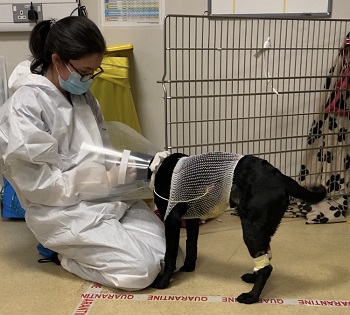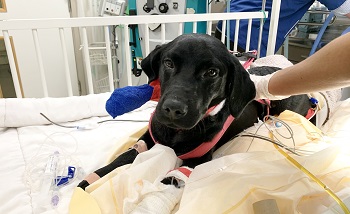Haemodialysis for Anuric Acute Kidney Injury
Clinical Connections – Spring 2023
Laura Cole, Staff Clinician in Veterinary Emergency and Critical Care, and Stefano Cortellini, Senior Lecturer in Emergency and Critical Care
A Labrador puppy with anuric acute kidney injury (AKI) with fluid overload and hyperkalaemia secondary to leptospirosis made a complete recovery after being treated at RVC Small Animal Referrals.
Oscar was referred to the Queen Mother Hospital for Animals (QMHA) at the age of six months for clinical signs compatible with leptospirosis infection – azotaemia, hepatopathy and thrombocytopaenia. Despite supportive care (intravenous fluid therapy, anti-nausea medications) and initiation of antibiotics, Oscar’s clinical signs progressed, he became oliguric and was referred for more intensive management.

On presentation Oscar was found to have clinical signs compatible with fluid overload – significant weight increase, chemosis and gelatinous skin. On initial blood tests Oscar’s potassium was within the reference interval but he had a severe azotaemia. Abdominal ultrasound supported a diagnosis of AKI.
He was given diuretic therapy and a urinary catheter was placed on admission. His urine output was monitored closely over the subsequent 12 hours. Oscar produced minimal-no urine during that time, and he became hyperkalaemic. In light of those findings – fluid overload, oliguria and severe life-threatening electrolyte derangements – Oscar was a candidate for dialysis.
After placement of a specific dialysis catheter, Oscar immediately underwent a dialysis cycle. Dialysis was performed using a Prismaflex machine – a platform designed for continuous renal replacement therapy in humans. The machine allowed us to perform prolonged intermittent renal replacement treatment over four hours and 30 minutes.
After the first dialysis cycle, Oscar was brighter, and his creatinine and potassium were respectively 414 µmol/L (R.I 27-14) and 3.9 mmol/L (R.I 3.6-4.6). A total of 150ml of fluid was removed from his body. However, he remained anuric over the next 36 hours and an additional dialysis cycle, lasting five hours, was therefore performed to reduce again his rising potassium concentration and azotemia.

Fortunately, following the second cycle of dialysis, and within four days of admission, Oscar converted to a polyuric phase of AKI – producing as high as 16ml/kg/h of urine initially. Intravenous fluid therapy was re-initiated at a rate to replace the renal loses, and adjusted based on his weight, hydration status and point of care blood tests. Oscar became hypokalaemic, as expected with a polyuric patient, and required electrolyte supplementation.
A nasogastric feeding tube was placed for assisted nutrition, and he was continued on antibiotics and gastrointestinal medication. He received anti-hypertensive therapy secondary to being transiently hypertensive during hospitalisation.
Oscar spent a total of 10 days in hospital during which his creatinine normalised prior to discharge. Oscar was discharged once he was eating and able to maintain his body weight. He still had an excessive thirst, compatible with the recovery phase of AKI. He had a recheck at his local vets at seven days and was found to be euhydrated and non-azotemic. His leptospirosis microagglutination test confirmed a diagnosis of leptospirosis.
The research study
One of the Emergency and Critical Care specialists, Dr Laura Cole, has a particular interest in acute kidney injury in dogs and at the time of Oscar’s visit was recruiting for a study investigating the prevalence of chronic kidney disease post-acute kidney injury, using routine biomarkers (creatinine and SMDA) and direct measurement of glomerular filtration rate using iohexol clearance test.
Oscar was enrolled in the study at the point of discharge and was first examined at three months. He was then re-examined again 12 months later for repeat measurements. At both visits he had initial blood tests and then was injected with contrast agent iohexol and had blood sample taken at 2,3,4 hours post contrast administration. Samples were submitted and analysed by the laboratory.
Oscar’s GFR has normalised at three months and by 12 months it had increased further and was better than average dog of his weight, indicating by 12 months post-injury Oscar has made a full renal recovery!
Oscar is one of 15 dogs enrolled in the study. Enrolment in the study is now complete and Laura looks forward to sharing her findings with the veterinary community.
